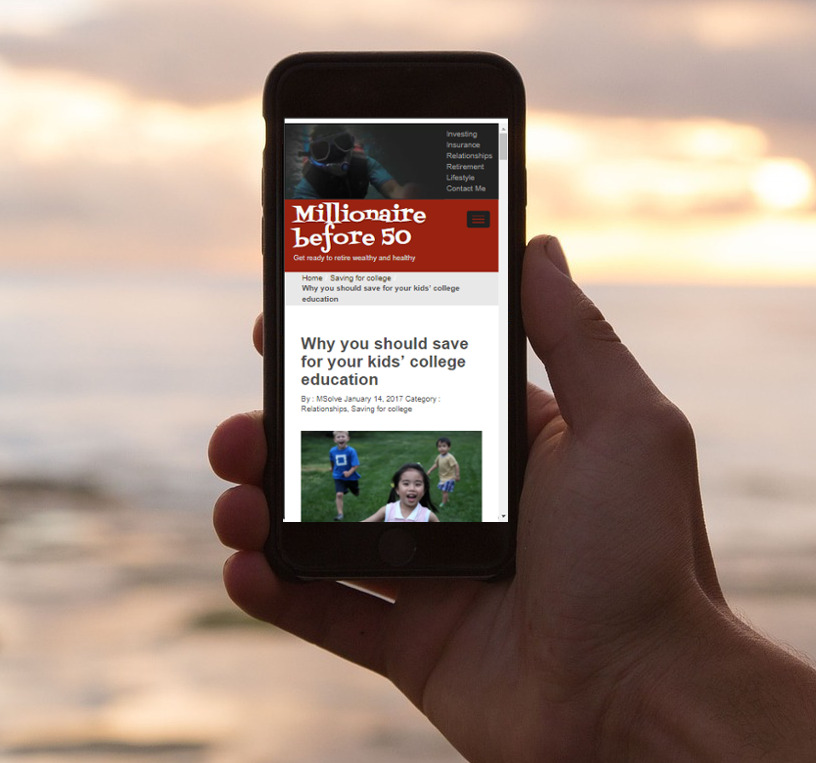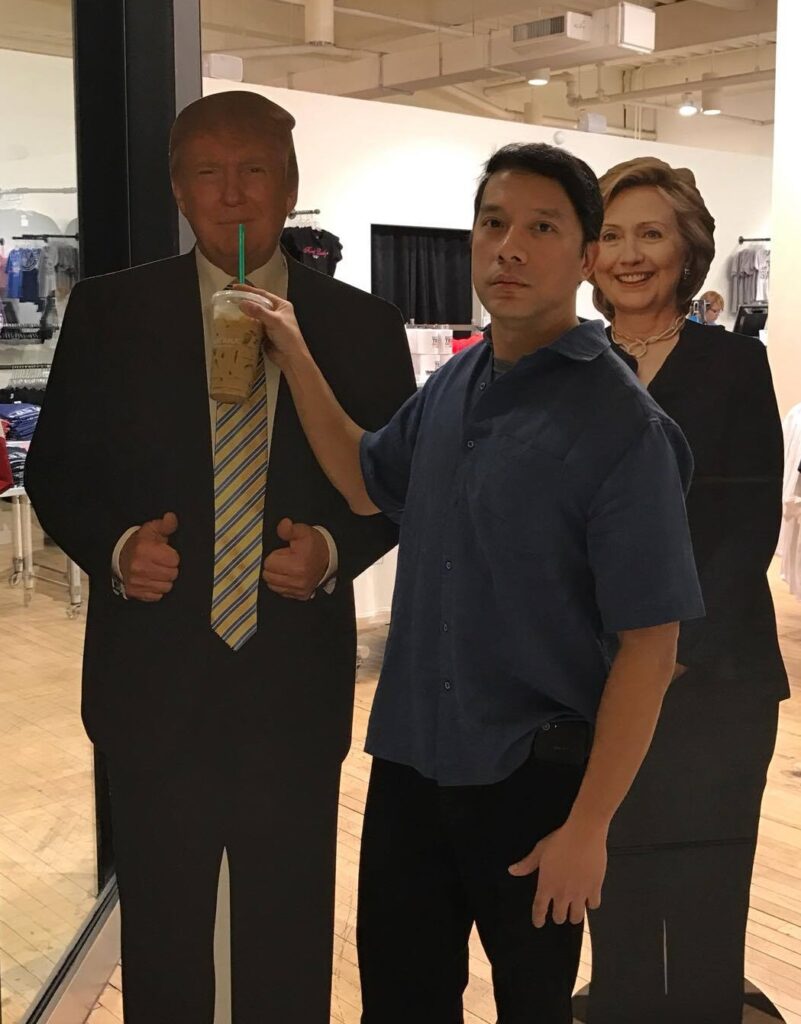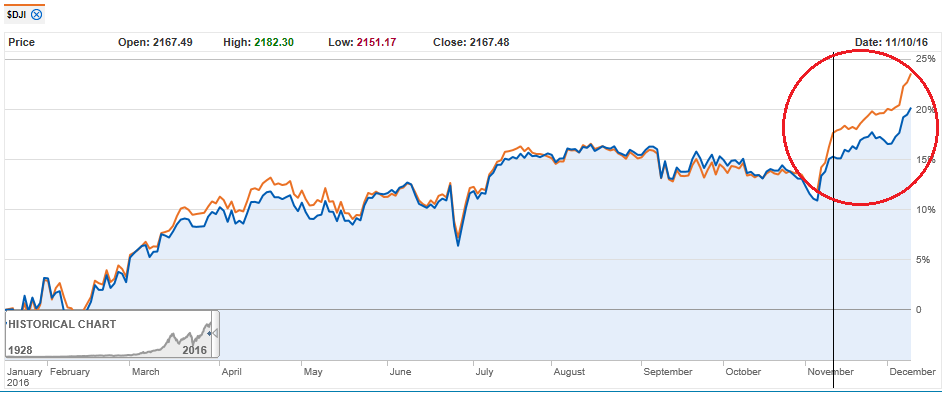Millionaire Interview 16 by Dividend Power
- By : Menard
- Category : About me
- Tags: American Dream

I recently got interviewed by a prolific blogger who runs the Dividend Power blog where he conducts a series of millionaire interviews. It’s an honor to be #16 on his list!
The article originally appeared on Dividend Power and was republished with permission.
Millionaire interview 16 is with the author of the Millionaire Before 50 blog. He is originally from the Philippines, but now lives north of Philadelphia, PA. He is 50 years old and married to a nurse with two kids. He has a bachelor’s degree in Computer Engineering and has worked as a software engineer in the finance industry for 25+ years. He reached the $1 million mark in 2016 around age 45. His current net worth is approximately $2.4 million. Now let’s take a look at Millionaire Interview 16.
1. Tell us a little bit about yourself.
I’m a youthful 50yo immigrant from the Philippines. I came to America at the height of the dot-com boom. It was 1997 and companies were bracing for Y2K, the turn of the millennium. Employers were scrambling to hire technology workers.
Unlike most immigrants though, it was fate that brought me here. My wife at the time, who was also in tech, accepted an offer to work in the U.S. I had no choice but to follow— we had a child together. So I dropped out of law school, abandoned my parents’ dream of me becoming a lawyer, and headed to the states.
Sadly, that marriage ended in divorce, custody was granted to the mother (which I didn’t contest), and I was ordered to pay $1,000 per month of child support payments.
Luckily, I didn’t have struggles with income. I have a bachelor’s degree in Computer Engineering and have been coding since I was 12. That is until the dot-com bubble burst. It was a terrible time for tech workers, I had to boomerang to a former employer for work.
I’ve been working as a software engineer in the financial industry for the past 25 years—specifically, in capital markets and wealth management space. 22 of those years were spent working for the same employer that first hired and rehired me.
I’m now happily married to a beautiful nurse. We live in suburban Philadelphia with two kids.
2. What is your net worth? At what age did you become a millionaire? How many years did it take to become a millionaire? Do you have any debt?
Our net worth is around $2.4 million. It was $2.5 the other day, lol. Rather than percentages, here’s a rough breakdown:
- Retirement accounts, $1.5M
- Real estate, $600K
- Primary home, $450K
- Inherited rental property, $150K
- Kids’ college fund, $190K
- Brokerage account, $140K
- Cash, $25K

We have no debt besides revolving balances on our credit cards we can pay off tomorrow. Our house is paid off. We don’t have car payments or student loans. We’re living the debt-free version of the American dream.
I became a millionaire the day Trump won— I was 45. Every time I mention this in a post, though, it seems that a reader unsubscribes from my blog, lol. I started investing in the stock market in my 30s, so I’m a late bloomer.
By “I,” I really mean “We.” That’s household net worth. We have combined finances, but my wife is completely hands-off when it comes to investing.
I don’t believe in debt. Contrary to Kiyosaki, the best leverage you can have on money is your spouse— not OPM (other people’s money). Marry the right person, and you can leverage your financial life on two fronts: income and spending. Marry the wrong one, and you can totally mess up your plan.
3. How did you become a millionaire?
No single investment made us millionaires. Becoming a millionaire in America is relatively easy. If you have a healthy income, relatively low expenses, and sufficient investments— it’s inevitable. You’ll eventually become a millionaire. One should focus on three things: income, spending, and investments. It’s like a 3-legged stool. If one leg is missing, you won’t be able to stand on it.
You need to acquire a marketable skill to earn a healthy income. Your career is your number one financial asset. But if you spend too much on education, it could backfire on you. Private education here in America is ridiculously expensive. One should pay extra attention to the ROI.
One of the biggest lies out there is you can’t get rich by simply getting a 9-5 job. Or you need multiple sources of income. Maybe not ultra-rich, but “Millionaire Before 50” rich, sure you can. The key is living way below your means so you can sock away low-cost Vanguard index funds like the one that tracks the S&P 500.
We sort of have multiple sources: my wife’s salary as an RN and mine as a software engineer (dividends don’t count because we bought the stocks using our salaries). For this interview, I’ve downloaded our social security earnings to generate the beautiful chart below:
As you can see, we hit a plateau in 2014. Unless you switch jobs or climb the corporate ladder, you normally wouldn’t get the same level of salary increases that you enjoyed in your 20s or early 30s.
So if you’re like us who couldn’t care less about promotions (and the additional responsibilities that go with it), you need to take control of your spending so you can invest like crazy early on.
That said, I’ve always been an entrepreneur at heart. I once owned and operated a small fitness gym in the Philippines where I also sold supplements.
I also used to sell CMS software online. This was before WordPress became popular. If you google “PortalMagic CMS,” that was a product I created 20 years ago. Someone seems to be selling it illegally over the web, ugh.
I could have grown the business, but it was too much of a risk for me considering we had to feed five people including my in-laws, which is typical in immigrant families.
In the end, it was our day jobs that made us millionaires.
4. What is your investing philosophy, and do you use a particular strategy?
I try to keep our investments simple— low-cost index funds inside tax-advantaged accounts, like a 401K, as the core holding. That way our money grows faster. The average fund manager can’t beat the market in the long run.
For fun, I have 10% of our liquid assets in a brokerage account where I buy individual stocks in great companies. I’m more of a “buy and hold” type of investor. I’m not a fan of technical analysis.
Currently, our portfolio asset allocation is as follows:
If I were to do it all over again, I’d invest in the MB50 three-fund portfolio: 60% VTI, 30% VGT, and 10% treasury bills for the long term. The treasury bills are there as a small hedge. I no longer believe in international funds.
Since VTI is too conservative for my taste, I added VGT, even with some overlap, because I’m bullish on technology. Think about it, technology is the only sector that every other sector heavily depends on in order to thrive: payment technologies, big data, cloud computing, and artificial intelligence, to name a few. The S&P 500 is tech-heavy for a reason.
I don’t want my money to be tied to real estate. I’d rather invest in completely passive liquid assets. This is ironic because my parents got wealthy from real estate. Probably because I still have memories of bad tenants trashing my parent’s rentals.
5. What was your best investment? What was your worst investment?
Not counting index funds, I consider Microsoft (MSFT) and Bank of America (BAC) as my best investments. Both pay dividends, but it was the growth that benefited me most.
I bought my first shares of Microsoft at around $25 per share. I regret not adding to my position when it was flat for a very long time. But I was able to stockpile shortly after Nadella started to call the shots. Now they’re worth over $250 apiece even after the NASDAQ crash.
Another favorite is Bank of America (BAC), which I bought in 2011 for around $7 each. Fast-forward to February 2020, I sold all shares for $33. That enabled me to pay off my mortgage shortly before the Covid-19 lockdowns. It gave me tremendous peace of mind when most people were afraid of losing their jobs.
I’ve made a lot of mistakes in the past. I once chased a high-performing “contrarian” mutual fund, JSVAX— 50% of its asset was concentrated in its top 10 holdings. The largest of which was St. Joe Corporation, a company that owns vast real estate in Florida. Sure enough, it went down the toilet during the 2008 mortgage crisis. This is why I cringed when everyone was recommending Cathy Wood’s ARKK early last year.
My recent mistake is Alibaba (BABA), which has been a victim of Chinese government regulation. The zero-covid policy in China made it worse. Fortunately, it’s a small percentage of my portfolio. But I plan to hold the stock indefinitely.
6. How much time per day or week do you spend reading financial news and going over your investments?
I read the financial news all the time. Even with the recent downturn, I still check my investments every night. It hasn’t affected my risk tolerance a bit. I’m always focused on the long term.
My immigrant mindset probably has something to do with it. Even if we lose 90% of our portfolio value, we’re still much better off than the vast majority of people back home. Worse comes to worst, we’ll just pack our bags and head back home.
Instead of the gloom and doom, I think about the fact that our 401K contributions, including the “catchup,” are buying more shares. And so are the dividend reinvestments. You’re like a flywheel storing kinetic energy ready to catapult when the market sentiment reverses its course.
We do rebalance our portfolio once or twice a year, but only if it gets out of whack with our goals. Being a DIY investor, I never sought anyone for help only because my investment choices are not that sophisticated.
7. What habits helped you become a millionaire?
I wasn’t always frugal. In fact, I blew the first five years of my discretionary income on tech gadgets. I bought a $2,000 Toshiba laptop and a similarly priced digital camera like they were nothing; only to get stolen in a parking lot in New Jersey.
Losing my job in the aftermath of the dot-com bust coupled with my divorce was the wake-up call. That’s when I realized it’s not always Christmas in the tech industry. And I needed to straighten my act together in order to keep up with the child support payments.
Fortunately, the work that I did for my next job gave me the investing know-how. The company collects investment returns from various fund managers, and we develop software that generates the beautiful charts you see in a typical mutual fund prospectus.
Learning about the power of compounding interest was like a lightbulb moment. I immediately downsized from a fancy apartment to renting a small room in a friend’s house, so I can max out my retirement contributions.
I became a cheapskate such that when I remarried in 2004, I convinced my fiance that we spend less than $500 on the wedding. The ceremony was held in our apartment and the reception, at the local Macaroni Grill. Our only guests were the pastor and his wife (our families were overseas).
It was a sharp contrast to my first wedding where hundreds of guests, among them very prominent people. I did have $50K saved but opted to use that as a downpayment for a house instead. I guess the studies were right: the less expensive the wedding, the more likely the marriage will last.
When we first moved to our house, my neighbor made fun of me after seeing me wearing a bonnet inside the house. It was winter and I had the thermostat set to 55 degrees.
Now that we’re millionaires I’m no longer that cheap. I don’t mind splurging on travel and vacations. My biggest splurge was probably building a $10,000 basketball court in my backyard instead of just buying a portable one for my driveway.
Yet my Tesla-driving neighbor who is saddled with student loans still thinks I’m a scrooge. He knows that my house is paid off, but he cannot fathom why I drive a 2012 Prius C.
The last time I calculated our savings rate, it was 63.45%. I automate all our investing as much as we can. We are blessed with sufficient income relative to the expenses that we seldom budget unless it’s a $5,000 expense.
8. What are your three favorite books related to investing, personal finance, retirement, and financial freedom?
My favorite finance books are:
- Millionaire Next Door
- Rich Habits
- Wealth By Virtue
I wrote a review about these books in my blog.
9. Why do you blog about your investing and journey to millionaire status and financial freedom?
Unlike many personal finance blogs, I started when I was close to millionaire status. I suddenly have lots of free time after our company was bought by a much larger one. I luckily got stripped of big responsibilities after the reorganization. It’s more like a journey to a $10 million net worth thing. So I’m not even close.
I write to motivate myself and help people. And with so many broke people around me making financial mistakes, I get inspired to write.
When you see an elderly woman struggling to move stuff into her car, what do you do? You help her. Then she thanks you. But when you see a random person doing stupid stuff about money, and you tell him. He’ll ask you to mind your own business.
Writing a blog about Personal Finance is a better alternative. That way, you can reach and help more people. Besides, not many immigrants blog about money.
Many Americans have no idea they won the lottery by simply being born in the states– you immediately have a massive leg up in life. In America, the poor drive a car and get welfare checks. Back home it’s a totally different experience. I’ve spent 25 years in the Philippines and 25 years in America. So that gives me a unique 50-50 perspective toward money.
10. Besides investing what else do you like to do?
Unless it’s raining or windy outside, I can be seen shooting hoops in my backyard or playing one-on-one against my twelve-year-old. It’s way more fun than shooting rounds of ammunition at a nearby range. Not to mention it’s free!
I also try to lift weights at least twice a week in my home gym to help maintain muscle mass— a must when you turn 50.
My wife and I spent a lot of time hiking in the Appalachians during the pandemic. I plan to do more of that when gas prices normalize.
11. Anything else you would like to add?
To your many readers who are just starting their journey: marry well, drive a cheap car, mow your own lawn, and stop eating junk. You’ll eventually thank me.
Final Thoughts on Millionaire Interview 16
I hope you enjoyed reading about the author of Millionaire Before 50 in Millionaire Interview 16.
Check out his blog when you get a chance. He writes about investing, lifestyle, savings, and retirement.
The author of Millionaire Before 50 has shown that it is possible to reach $1 million by your mid-40s by living below your means, saving, living frugally, and investing.
In an earlier article we identified the three principles of dividend millionaires: spend less than you earn, invest your savings, and reinvest the dividends. Your odds of becoming a millionaire are about 3.6% in the US. Achieving FIRE is a process. However, I would argue that through careful planning, high saving rates, and investing you can improve your odds.
The author of Millionaire Before 50 showed us it is possible in your mid-40s in Millionaire Interview 16. Recall, in the US, the average net worth is about $728k in 2016 dollars for those between 35 and 44 years old. We have written previously on net worth targets by age.
As a final note, Dividend Power has another series called Secret Dividend Millionaires. This one is about ordinary people who became millionaires by investing in dividend-paying stocks for the most part. Most of these people were only discovered after they died and left their money to charities and other non-profit organizations. Often, they became millionaires through very frugal if not austere living, investing their savings in stocks that paid dividends, and reinvesting the dividends.
Thanks for reading Millionaire Interview 16 – Millionaire Before 50!
This article originally appeared on Dividend Power and was republished with permission.



No Comments